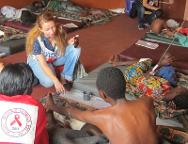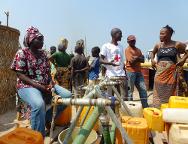Central African Republic: Persistent violence causes great concern
22-01-2014 Operational Update No 03/2014
As a semblance of normality returns to Bangui, violence grinds on elsewhere in the country, particularly the north-west. The ICRC and the Central African Red Cross Society are stepping up their efforts to bring aid to the victims.
Even though an unsure calm can be seen to be returning to the streets of the capital, where life is gradually returning to normal despite ongoing sporadic outbreaks of violence, armed men who are out in strength on the roads leading out of Bangui to the north and west continue to expose the population to attacks.
Over the past three days, Central African Red Cross volunteers have buried over 60 bodies in the area around Bossembélé, Boyali and Boali. The ICRC has removed 29 injured people from the same area. On 18 January, an aircraft chartered by the ICRC landed at Bangui with a 26-tonne load of medical supplies.
The violence is pushing ever more people to take refuge in the bush or in places of worship. The large numbers of displaced people in Bangui do not yet feel secure enough to return to their homes.
In the north of the country, hundreds of people from the capital, including armed men, continue to flow into the Vakaga region, near the borders with Sudan and Chad. For Gabriel Mukalai, head of the ICRC sub-delegation in Ndélé, "The presence of heavily armed men in the area, which has been spared the violence that has rocked Bangui and the rest of the country, is disturbing."
"We are extremely concerned about the welfare of the people. We are calling on all those who have armed themselves to respect human life and dignity," said Georgios Georgantas, head of the ICRC delegation in the country. "The transitional authorities of the Central African Republic and the international armed forces in the country must take immediate action to provide security. Until that happens, people will continue to live in fear."
Treating the injured: a priority

An ICRC delegate in discussion with a patient in the trauma unit of Bangui's community hospital. An ICRC surgical team has been treating casualties there since the beginning of January 2014.
© ICRC / Nadia Dibsy
"The priority is to administer first aid and to manage mortal remains with dignity. The number of casualties in Bangui has been going down, but needs are increasing elsewhere," said Bonaventure Bawirutwabo, the ICRC's medical coordinator in the country. "There is an acute shortage of suitable care facilities in the backcountry. That's why we are arranging to have the most seriously injured people taken to Bangui's community hospital, where one of our medical teams has been hard at work since the beginning of January."
ICRC and Central African Red Cross personnel have gone to Bossembélé, Boyali and Boali, north-west of Bangui, to provide care on the spot for people with minor injuries and transfer the seriously injured to hospital. To facilitate the work of Central African Red Cross volunteers, the ICRC provided them with first-aid equipment and the supplies needed to recover and handle mortal remains.
Maintaining relief effort for thousands of displaced people

Bangui airport. The distribution of water is organized by women in the community. Families queue up with their yellow containers under a blazing sun.
© ICRC / J-Y Clémenzo
The priority for thousands of displaced people in Bangui as elsewhere in the country is to obtain shelter and other basic necessities. "People are fleeing the violence in great haste, often leaving everything behind," said Mr Georgantas. "They need security, but they also need water, food and health care."
Highlights of the past week's activities:
- Three additional wells were built and water services provided for 10,000 people in the city of Ndélé.
- More than 210,000 litres of clean drinking water were delivered each day to Bangui airport in cooperation with the national water board to meet the needs of tens of thousands of displaced people living there.
- Some 15,000 litres of clean drinking water were delivered every day to Boy-Rabe monastery, where 30,000 people have taken refuge.
- Enough food was distributed to 7,000 people at the Carmel mission in Bimbo, south of Bangui, to cover their needs for one week.
- Operations were performed on 65 patients at Bangui's community hospital by an ICRC surgical team.
- Nearly 950 patients, including 169 who came for ante-natal checkups and 13 to give birth to a child, have been seen since the beginning of the year by the medical staff of mobile clinics in Kaga Bandoro, in the centre of the country.
- Three visits to places of detention were carried out to assess conditions. Emergency action was taken in the Ngaragba detention centre, where food was distributed to 45 detainees.
For further information, please contact:
Nadia Dibsy, ICRC Bangui, tel: +236 75 64 30 07
Wolde-Gabriel Saugeron, ICRC Geneva, tel: +41 22 730 31 49 or +41 79 244 64 05